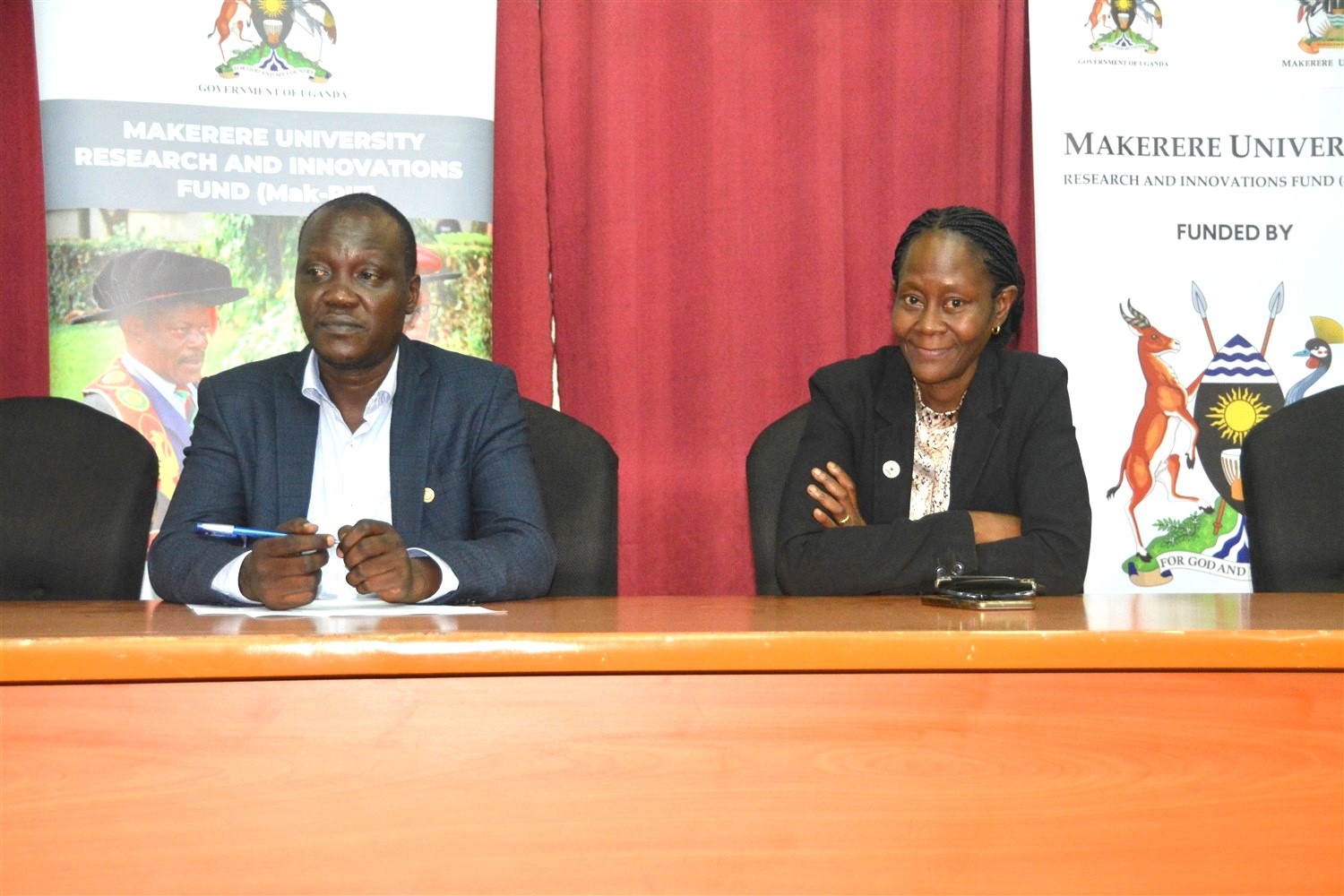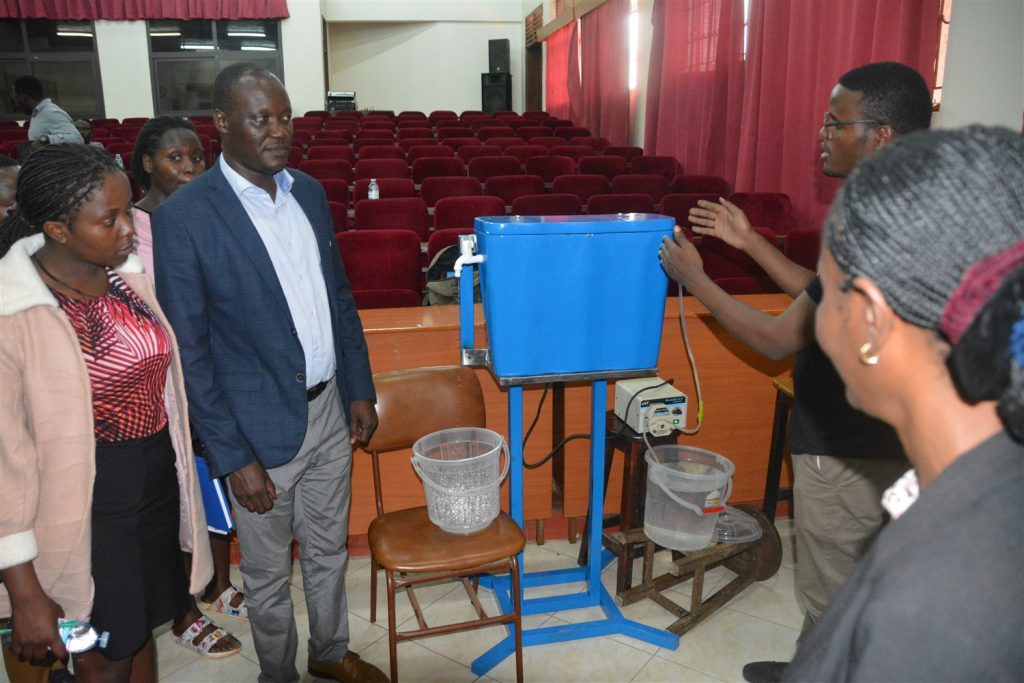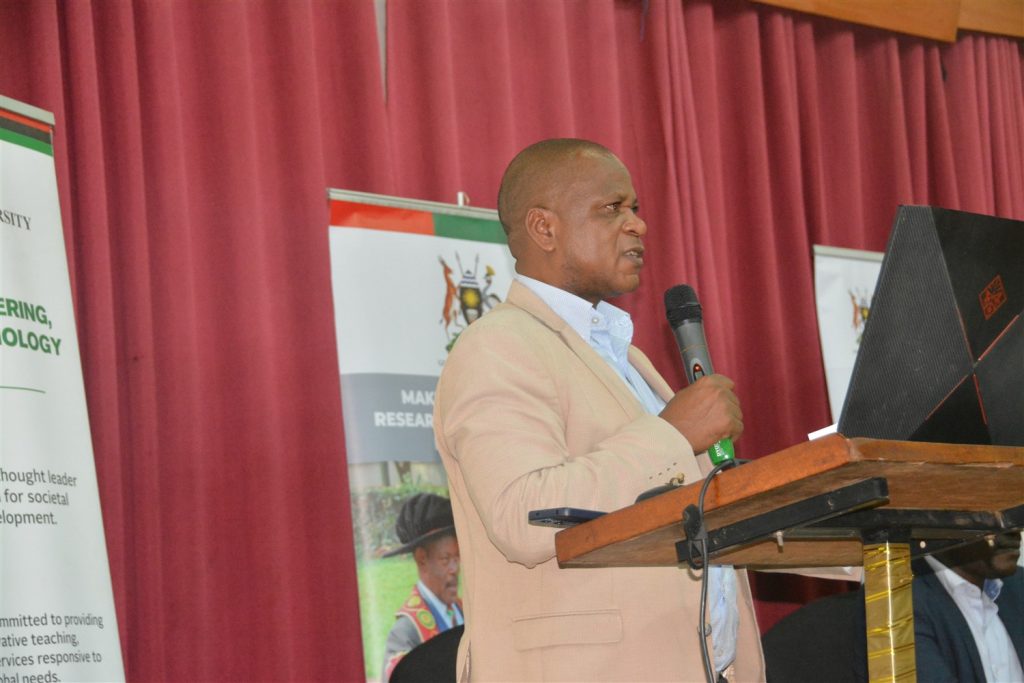The College of Engineering, Design, Art and Technology (CEDAT) conducted a Research Dissemination of two studies aimed at the Development of Materials for point of use water treatment systems.
The investigations were conducted by a team of researchers comprised of P. W. Olupot, H. M. Kalibbala, E. Menya, G.M. Wangi, J. Jjagwe, J. Wakatuntu, M. Turyasingura, R. Walozi, C. Kanyesigye and R. N. Kulabako.
The dissemination event held on Wednesday 29th November 2023 follows the successful completion of two MakRIF supported Research projects namely; Development of rice husk based granular activated carbon for point-of-use water treatment systems and Development of zeolite-based nanocomposite filters for drinking water treatment.
The findings therefrom make a contribution towards provision of safe water at points of use. This is premised on the fact that surface and ground water from lakes, swamps, ponds and boreholes, the main water sources in Uganda get contaminated with microbes, nutrients, heavy metals, organic chemicals, oil and sediments that come from human activities such as agriculture, municipal waste, pharmaceuticals and industrialization. These pollutants cause various water borne diseases. Most of the public conventional water treatment systems are not equipped to remove some of the pollutants such as heavy metals.
The research team set out to develop Point of Use (POU) water filtration systems tailored to a wide range of source water quality to empower households to effectively treat water at home using Granular activated carbon (GAC), especially from renewable biomass sources and nanomaterials which are the two common materials championed for POU systems.
While welcoming the participants to the dissemination event, the Principal, College of Engineering, Design, Art and Technology (CEDAT) Assoc. Prof. Moses Musinguzi commended the research teams for their work and the fact that they competitively applied and won the grant from the Government of Uganda through MakRIF. He applauded the Department of Civil and Environmental Engineering, the Department of Mechanical Engineering and other Departments that partnered with the Research teams to undertake the research.
Prof. Musinguzi, while emphasizing the importance of the study in addressing water as a pertinent issue said every human being, animals and plants are users of water and therefore the investigation about treatment of water at the point of use was of paramount importance. ‘Today there are a number of diseases related to the water we take and hence the need to investigate how safe the water we take is. When we take the water from the reservoirs, it is transported through pipes or naturally and in the process there could be some contamination. Treating the water at the point where it is going to be used is very important’, he emphasized.
He said by undertaking the study, the team was making a big contribution towards the ranking of the University citing the Times Higher Education ranking, which has teaching as the first parameter, followed by research or research influence, income generated through research, and research productivity. Citation, how many other researchers are making use of your publication, he said, is also considered and further stressed the need for increased and improved research given that with a score of 60%, drawing 30% for research and 30% for citation, places a university at a very competitive edge in the rankings. As a college we encourage all our members of staff to undertake research and work with the Industry, he said.
Dr. Kalibbala Herbert Mpagi a member of research team while giving the background to the study said that the world was changing mentioning the example of climate change, the chemicals used, the degradation of water resources, and the various pollutants. He said the existing treatment systems have not been spared and have to find a way to fit into what is prevailing like the introduction of new materials to be used in water treatment. He said through the transmission and distribution systems, the water was prone to contamination and this, he said, explains the choice of the end user point for treatment in the investigations.
As a result of emerging pollutants, Dr. Kalibbala said the team opted to use absorbents and so the study was undertaken on activated carbon from rice husks and the Nano zeolite composites for use at the point of use.
Dr. Robinah Kulabako one of the Principal Investigators in her presentation on the Development of zeolite based Nano composite filters for drinking water treatment in Uganda said the study was offering proposals or options that could be looked at as alternatives to drinking water treatment in Uganda.
‘We need water when it is safe but in real life we find that there are many contaminants that are not visible to the eye but are a public health risk if the water is ingested. What we are looking at here are those parameters in the water that are health hazards, she explained.

Dr. Kulabako noted that in the recent past there has been a deterioration of the water resources attributing this to increasing population growth, climate change and the increasing pressure on the fresh water resources both on the surface and underground. She said there were industrial effluence which are inadequately or not treated, agricultural run offs, pesticides, fertilizers all of which end up in the fresh water sources, leading to deteriorating quality of the water in terms of nutrients as well as heavy metals that are potentially associated with cancer and other disease causing organisms.
While talking about the existing water treatment centers, she explained that these were centralized, are costly to install and maintain and mainly in urban centers. She said the contribution through the studies undertaken was in the area of access to safe water nearer to the user, with affordable solutions by the use of natural Zeolites that are prevalent in Eastern Uganda.
Dr. Peter. W. Olupot from the Mechanical Engineering Department made a presentation about Activated carbon for use at the point of use. He said that there were a lot of rice husks that could be used to produce activated carbon that can be used in the treatment of water. Point of use water treatment systems on the market are not affordable to the ordinary citizen, he observed, and hence the need for a cheaper and user friendly option as proposed in the study.

He explained that the study on using renewable bio based materials for generating activated carbon for use in point of use systems was in response to the situation where many people were taking contaminated water with pollutants of emerging concern. The study recommended that the public water treatment systems should adopt the use of these materials in addition to their protocols and encouraged people that can afford to buy the point of use water treatment system that are on the market.
While making remarks at the closure of the event, Dr. Zahara Nampewo who represented Prof. Masagazi Makerere University Research and Innovations Fund (MakRIF) said the main objective of the fund is to increase the local generation of research that can be translated and scaled up into innovations that address gaps that service Uganda’s Development Agenda especially those underfunded priorities. she said the studies that were disseminated were supported by RIF because they support the development agenda. She said access to clean water is key and is part of the National Development agenda number 3, but not only water but also the environment, retaining and preserving the natural resources and climate change.
She said the issue of human capital development was also central to the development agenda, because without a healthy human resource nothing much can be done in development. The contribution in terms of access to clean and safe water contributes to the development of the nation especially targeting vulnerable groups like women and children.
She noted that in line with the research led initiative of the University, such research work supports the growth of research leadership in the University. She implored the researchers to actualize the results and translate it into something that can support the life of Uganda and strengthening the role of the university bay addressing issues that affect the people.

Authored by Harriet Musinguzi, Principal Communication Officer, CEDAT
Posted by Isemaghendera Alex, Web Administrator, CEDAT



